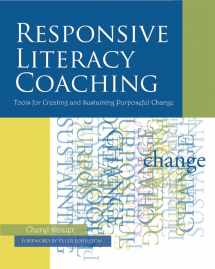
Responsive Literacy Coaching: Tools for Creating and Sustaining Purposeful Change
Book details
Summary
Description
In Responsive Literacy Coaching, Cheryl Dozier draws on twenty-four years of experience as an elementary classroom teacher and teacher educator to present both a theoretical framework and practical tools to enact responsive literacy coaching. Through thoughtful and purposeful coaching, teachers learn effective ways to improve literacy instruction and student achievement.
The range of tools offered in the text invite customization based on the reader's specific instructional context. This framework empowers literacy coaches and teachers through conversation, sustained engagement, and reflective analysis. Dozier argues that at its best, literacy coaching is responsive, collegial, thoughtful, thought-provoking, deliberate, reflective, and transferable. In this book she invites readers to enter into a coaching dialogue, through:vignettes that bring coaching interactions to life;prompts to engage both teachers and students;occasions for collaborative reflection; frequently-asked questions.
As literacy tasks are documented and analyzed, coaching interactions logged and categorized, and assessment scores scrutinized, Dozier cautions coaches to avoid being so caught up in the doing of coaching that one forgets the purpose behind it. In this book she provides an occasion for them to step back, and ask, what is the goal of literacy coaching? What kind of literacy environments and experiences are we creating for our schools and our students? What is possible as we engage in transformative literacy practices? While the tools offered in this book do not provide a “quick fix,” they foster critical thinking and sustained inquiry that leads to positive change for both teachers and students.


We would LOVE it if you could help us and other readers by reviewing the book
Book review



